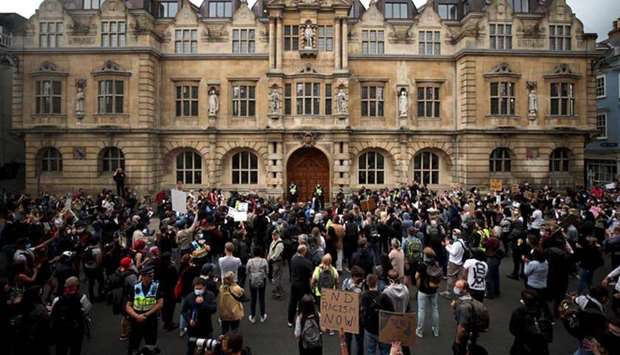The government will tell the EU on Friday it is not going to seek an extension to the Brexit transition period, the paymaster general, Penny Mordaunt, has said.
She told the House of Commons in an update on Brexit talks that she and Michael Gove would “emphasise that we will not be extending the transition period” when they meet EU counterparts at a Brexit joint committee meeting on Friday.
It led to an immediate accusation of the government behaving recklessly, with the Scottish National Party MP Pete Wishart accusing the Conservatives of trying to “heap misery upon misery” with Covid-19 and Brexit “the twin horsemen of the economic catastrophe” denying any prospect of recovery.
Mordaunt insisted the country would not be “barrelling off a cliff edge” and hoped to have a deal by autumn.
It said the government would be able to divert money from the EU coffers to to “level up” the British economy.
Mordaunt also strongly hinted that no-deal planning was back on the table.
Asked what preparations the government was making for a collapse in talks she told the House it “would be prudent and wise for us to prepare for every scenario”.
Rachel Reeves, the shadow chancellor of the Duchy of Lancaster, pressed the government to honour the “oven-ready” deal Boris Johnson promised in his general election campaign.
She was speaking as the former environment secretary Theresa Villiers said the government would not succumb to EU demands to access British fishing waters.
“We are not going to see the compromises coming from Boris’s government,” Villiers said, arguing that the common fisheries policy (CFP) was “grossly unfair”. Her comments came days after Brexit talks over a future trade deal hit the buffers with four major areas of disagreement, including access to British seas for EU boats.
“I just don’t see that the government is going to just shift in any substantive way from what is put on the table already,” Villiers told an Institute for Government webinar yesterday.
She said the government was “intensely conscious of how crucial fisheries are to the Scottish economy” and fishing communities and would defend them.
The impasse over sharing British fishing waters has thrown the prospects of a Brexit deal into disarray, with the UK and the EU calling for an acceleration of talks to try to break the logjam in July.
The government has consistently said it will not extend the transition period, which ends in December.
Catherine Barnard, a senior fellow at the thinktank UK in a Changing Europe, said in a separate report published yesterday the threat of no-deal raised the prospect of ugly fish wars in addition to trouble over the jurisdiction of the European court of justice in disputes over trade and state aid and European convention on human rights.
Salmon exports, a significant part of Scotland’s fishing economy, would become a more expensive option for EU diners with a 2% tariff on fresh salmon and 13% on smoked salmon.
A recent study by the Wageningen University in the Netherlands suggested that while UK fishing would gain $420mn (£400mn) from having exclusive access to UK waters, it would lose $500mn from the imposition of tariffs and non-tariff barriers on its exports.
Villiers, who campaigned for Brexit, said the fishing communities “were sacrificed” when the UK joined the European Community in 1973 and would be defended.
“It is not the stated intention that we would keep our own British waters exclusively free for our boats, but I think many people including myself believe that that historic share of resources to which British vessels have had access on CFP is grossly unfair, and we do need to remedy that.”
Two weeks ago, the EU’s chief Brexit negotiator, Michel Barnier, consulted 11 fishing ministers about his mandate but UK hopes of a “more realistic” approach from the EU failed to materialise in the fourth round talks last week.
While fishing remains one of the most emblematic issues for Brexiters, the report by UK in a Changing Europe warns of the wider implications.
Crashing out would strain future relations with the EU and according to Barnard would present “significant legal trouble”.
While some believe Johnson is minded to bury the economic and business pain of no deal in the coronavirus crisis, Jonathan Portes, one of the report’s authors, said he did not think the economic shock of the pandemic would “provide much of a smokescreen, as it were for the economic impacts of what happens in January”.

Demonstrators protest for the removal of a statue of British imperialist Cecil Rhodes at Oriel College in Oxford yesterday.
